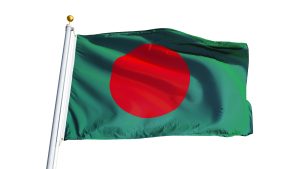Recent developments in Dhaka, notably the finalization of Bangladesh’s draft Indo-Pacific outlook by the Foreign Ministry, have led some to speculate that Bangladesh has “embrace[d]” the U.S. Indo-Pacific Strategy. A series of high-level visits to Bangladesh – centered around conversations on the Indo-Pacific – from U.S. National Security Council Senior Director for South Asia Rear Admiral Eileen Laubacher’s visit in January to British Indo-Pacific Minister Anne-Marie Trevelyan’s visit on March 10 – have reinforced this idea.
Earlier last month, in a speech in New Delhi outlining Japan’s “new” plan for a free and open Indo-Pacific (FOIP), Prime Minister Kishida Fumio spoke about the need for cooperation with Bangladesh under the “free and open Indo-Pacific” (FOIP) framework to harness the economic potential of the Bay of Bengal region. Local news reports from early March suggest that Admiral John Aquilino, commander of U.S. Indo-Pacific Command is slated to visit Bangladesh “in the coming weeks.”
The interest among these key Indo-Pacific players to include Bangladesh in their Indo-Pacific approaches is neither new nor surprising. As a key littoral in the north of Bay of Bengal – through which important sea lines of communication pass – Bangladesh has an important role to play in facilitating free maritime passage through the Bay, which forms part of the larger Indo-Pacific. As early as 2014, the United States discussed developing the Indo-Pacific Economic Corridor with Bangladesh as part of the third U.S.-Bangladesh partnership dialogue. Even the Trump administration, which adopted a restrictive geographic delimitation of the Indo-Pacific region in its 2017 National Security Strategy, acknowledged Bangladesh as an “important partner” in the region. Bangladesh also finds mention in Japan’s vision of Indo-Pacific as outlined in its 2019 “Towards Free and Open Indo-Pacific” policy document.
In response, Dhaka adopted a “wait-and-see” approach, possibly since the “Indo-Pacific” concept was being seen as an attempt to counter China, which is Bangladesh’s top trading and arms supplier. Such a response is not unique to Bangladesh, but was visible across South and Southeast Asian countries, which share a complex relationship with China marked by a high level of interdependency.
Over time, Dhaka’s approach has taken the shape of a more mature balancing act wherein it leverages ties with the United States to “set better terms with both China and India.” Bangladesh’s stern reaction to Chinese warnings over Dhaka’s possible participation in the Quad indicates that it does maintain an independent foreign policy position. Similarly, Dhaka seems to have ignored China’s caution to Bangladesh on joining the Indo-Pacific Economic Framework (IPEF) by going forward with its study on whether IPEF would be beneficial to Bangladesh’s own national interest.
While it may be tempting to read these foreign policy choices as “embracing” the Indo-Pacific, a closer look at these decisions reflects a continued sense of hesitancy characteristic of Bangladesh’s balancing approach. Concerns in Bangladesh’s strategic community about arms proliferation in the region due to initiatives such as AUKUS are reflected in the government’s position. Bangladesh’s refusal to engage with United States on discussions on security of the Bay of Bengal region reflects continued mistrust toward the U.S. security role in the region.
Bangladesh’s skepticism toward the Indo-Pacific was on display during U.S. Under Secretary for Political Affairs Victoria Nuland’s visit to Bangladesh in March 2022 The trip was depicted by Washington as an attempt to “underscore U.S. commitment to, and cooperation with Indo-Pacific partners,” but the press release by the Bangladesh’s Ministry of Foreign Affairs on the visit outlining areas of discussion makes no mention of the Indo-Pacific. Even Bangladesh’s latest Indo-Pacific Outlook, which is awaiting Prime Minister Sheikh Hasina’s approval, only discusses Bangladesh’s interest in the region from an economic point of view, with military or defense issues “completely avoided.”
The Ukraine conflict has complicated foreign policy choices for countries by constraining the space for balancing as the zero-sum nature of great power competition becomes acutely visible. The Indo-Pacific is emerging as the foremost theater for such competition, making it difficult for countries such as Bangladesh to adopt a neutral stance. However, premature assumptions that Bangladesh would join Indo-Pacific initiatives as the competition intensifies misread fundamentals of Dhaka’s foreign policy and the deep nature of Bangladesh-China ties.
For China, Bangladesh is a key lynchpin in the Maritime Silk Road, and Dhaka is an active participant in it. China has invested heavily in Bangladesh’s naval modernization, including through financing of the country’s submarine base, which will house the two Chinese Ming-class Type 035B diesel submarines that Bangladesh bought from China in 2013. Possibly to discourage Bangladesh’s growing comfort with the Indo-Pacific, at a recent gathering of journalists at the Chinese embassy as part of the annual Spring Dialogue, Chinese Ambassador to Bangladesh Yao Wen outlined China’s position on “the so-called Indo-Pacific Strategy” and how it has “very strong defense elements.”
As Bangladesh tries to navigate the strategic competition in the Indo-Pacific, its actions will be governed by its foreign policy adage: “friendship to all and malice towards none.” Toward that end, Bangladesh will remain committed to non-alignment and neutrality through participation in a variety of multilateral institutions in the region, whether it is Washington’s IPEF, the China-led Indian Ocean Region Forum, or the multilateral Regional Comprehensive Economic Partnership (RCEP).

































